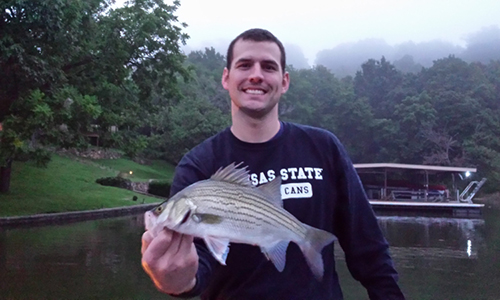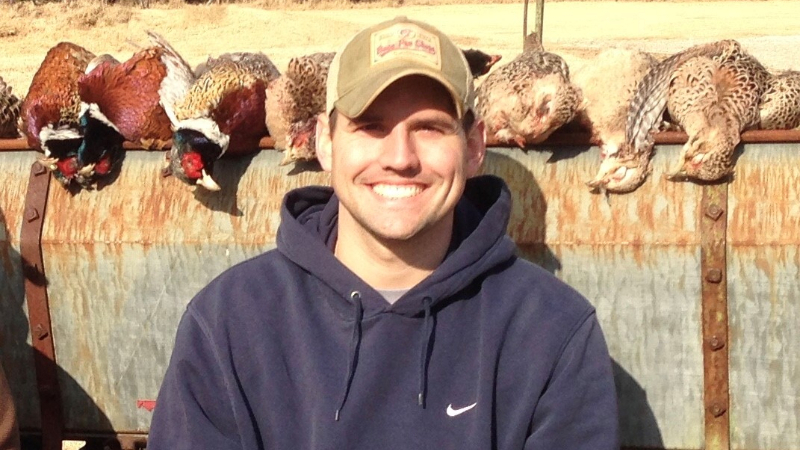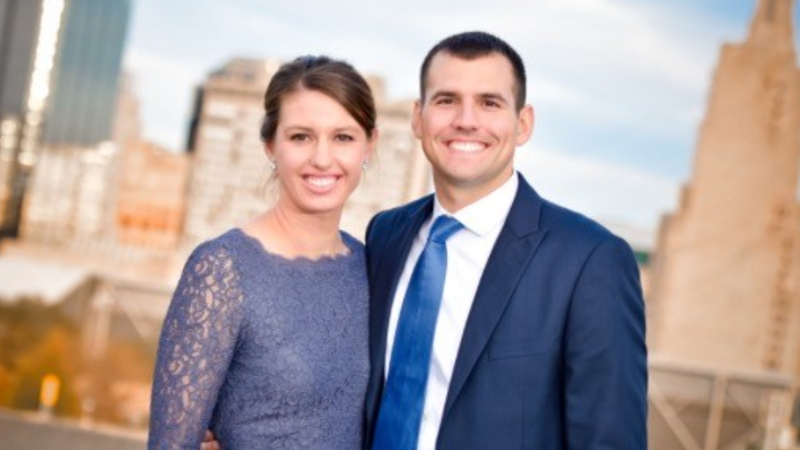Andrew Erker was a gritty defensive back from the time he started playing tackle football at age seven through the five seasons he played for Kansas State University. Erker was a big hitter on the field but a loving and caring man off it. He spoke often about his concussion history in football and became more forgetful and impatient in the last year of his life. On January 11, 2017, Erker died by suicide at age 30. His family donated his brain for Chronic Traumatic Encephalopathy (CTE) research to the UNITE Brain Bank. Researchers there diagnosed him with Stage 3 (of 4) CTE. His widow Hannah Erker wants to share Andrew’s story to show the effects of CTE and to prevent future cases of the disease by advocating that children do not play tackle football.

The morning of January 11, 2017 started out just like any other morning. Andrew got out of bed early to send me off to work with a big hug, kiss, an “I love you” and his typical, “Whatever you do today, just be a good person.”

Andrew’s number one priority in life was to be a good person regardless of the circumstance. He never failed to live up to that standard he set for himself. I would always receive a text late morning just to check in and see how my day was going. Not hearing from him at all that day in January made me a little uneasy. Driving home from work that night I knew in my gut something was very wrong. Andrew died by suicide earlier that day in our home.
This horrific tragedy came as a massive shock. Surely that wasn’t him. It didn’t make sense. Andrew had such a love for family, his friends and me. His enthusiasm for life, nature and wildlife was unmatched. He would light up a room with his smile. Andrew was the most selfless man I had ever known. His intentions to make everyone happy and be a better version of themselves were as pure as they come.

Something in his brain was not right that day and hadn’t been for a long time. Andrew was not the type to complain or ask for help. He refused to burden or worry anyone. He wanted to do it all himself and was determined to do so. I believe he suffered internally for longer than I knew or could ever imagine. Andrew’s sense of humor was one of his best qualities. He was constantly making everyone around him smile and laugh. For as long as I knew him he would joke about football messing up his brain. He believed it made him “stupid” even though he was thriving at work and nothing about his daily life made it seem like he was missing a beat. Joking about it I believe was his way of trying to tell me something wasn’t quite right without making me worry. When Andrew and I started talking about having a family his number one rule was that our kids would not play football. It was becoming clear to me that he was truly worried about the toll football took on his brain.
Andrew and I met at a bar in Kansas City in 2014. I was 22, still in nursing school and he was 27 living in Lincoln, Nebraska. He was home for a weekend and out with friends when we met. From the moment I met him I knew he was incredibly special and early on we both knew it was meant to be. He moved back to Kansas City the following year and we were married in April of 2016. Nine months later he was gone.

Andrew played tackle football from the time he was a child through his college career at Kansas State University, where he played safety. Andrew was not the biggest player on the field, but he was tough and known for his hard hits. I believe Andrew suffered several undiagnosed concussions during his time playing football. He told me about several games he didn’t remember after playing in them and times where he just didn’t feel quite right after games.
A few months before he died, I started noticing the forgetfulness. He couldn’t recall certain conversations or plans we made. Towards the very end of his life he became more irritable and his patience was diminishing. Although his anger seemed to be heightened in the last couple weeks of his life, I do feel as though his emotions were fairly well controlled. It seemed as though Andrew was somehow able to mask many of the typical signs and symptoms of CTE.

Andrew’s family and I decided right away to donate his brain based on his football history and his recent behavior. Andrew was always helping others so when donation became an option I knew he would jump at the chance to try and help save someone else’s life. Boston University was an obvious choice for us, and I could not be more grateful for how we were treated and supported during this incredibly difficult time. I felt as though Andrew was respected and appreciated by the researchers from the UNITE Brain Bank from day one. Seven months after he died, Andrew was diagnosed with Stage 3 (of 4) CTE. We were all shocked to see such advanced disease in a 30-year-old.
I want people reading Andrew’s story to understand the dangers and possible effects playing tackle football as a young child can have on your brain and your life. I want people to know that CTE can happen to anyone with a history of repeated head impacts like Andrew had. Choosing to put your child in tackle football at a young age could end up destroying their life and leaving their loved ones completely devastated. I know Andrew would have much rather sacrificed his football career for his life than his life for his football career.
I feel incredibly lucky to have fallen in love with a man who I know fought like hell against an uncontrollable brain disease to protect his friends and family.
__________________________________________________________
Suicide is preventable and help is available. If you are concerned someone in your life may be suicidal, the five #BeThe1To steps are simple actions anyone can take to help someone in crisis. If you are struggling to cope and would like some emotional support, call the Suicide & Crisis Lifeline at 988 to connect with a trained counselor. It’s free, confidential, and available to everyone in the United States.
Are you or someone you know struggling with lingering concussion symptoms? We support patients and families through the CLF HelpLine, providing personalized help to those struggling with the outcomes of brain injury. Submit your request today and a dedicated member of the Concussion Legacy Foundation team will be happy to assist you.

